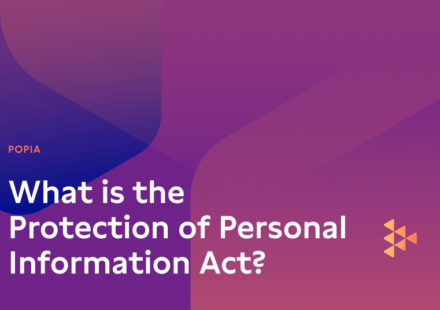The Protection of Personal Information Act (POPIA), is a pivotal South African data protection law crafted to govern the handling of personal information by both public and private entities. Its core mission is to safeguard individuals’ personal data while fostering the responsible and ethical utilization of such information. POPIA aligns itself with international data protection standards and draws inspiration from the European Union’s General Data Protection Regulation (GDPR).
Who Must Adhere to POPIA?
Applicable to a wide range of entities, the Protection of Personal Information Act mandates compliance from both private and public sectors involved in the processing of personal information within South Africa. This encompasses corporations, governmental agencies, non-profit organizations, and any other entities that collect, process, store, or share personal data of South African residents. A notable aspect of POPIA’s applicability is its requirement for adherence by any organization that, while not based in South Africa, utilizes resources or means within the country for processing data. For instance, an international e-commerce company using a South African server to store customer data must comply with POPIA, highlighting its broad reach and impact.
Comprehensive Overview of POPIA’s Structure
Structured into 12 chapters, the Protection of Personal Information Act provides a detailed framework for the lawful handling of personal information. A key section of this legislative framework is Chapter 3, which is divided into 8 Conditions for the Lawful Processing of Personal Information. These conditions range from ensuring accountability and processing limitations to specifying the purposes for data collection and ensuring the quality and security of the information processed. Here is a breakdown of Chapter 3’s 8 Conditions for Lawful Processing:
Chapter 3 Conditions for Lawful Processing
Part A: Processing of Personal Information in General
Condition 1 – Accountability
- Section 8: Responsibilities of the party ensuring lawful processing
Condition 2 – Processing Limitation
- Section 9: Legitimacy of processing
- Section 10: Minimization
- Section 11: Consent, justification, and objection
- Section 12: Direct collection from data subject
Condition 3 – Purpose Specification
- Section 13: Collection for specific purposes
- Section 14: Retention and restriction of records
Condition 4 – Further Processing Limitation
- Section 15: Compatibility with the purpose of collection
Condition 5 – Information Quality
- Section 16: Quality of information
Condition 6 – Openness
- Section 17: Documentation
- Section 18: Notification to data subject during personal information collection
Condition 7 – Security Safeguards
- Section 19: Integrity and confidentiality measures for personal information
- Section 20: Information processed by an operator or authorized individual
- Section 21: Security measures for information processed by an operator
- Section 22: Notification of security compromises
Condition 8 – Data Subject Participation
- Section 23: Access to personal information
- Section 24: Correction of personal information
- Section 25: Manner of access
Part B – Processing of Special Personal Information
These sections (26-33) collectively delineate the regulations governing the processing of special personal information under data protection laws. Section 26 establishes a prohibition on processing such data unless certain conditions are met, while Section 27 provides a general framework for lawful processing. Sections 28 through 33 further specify the authorization required for processing various categories of sensitive information, including religious or philosophical beliefs, race or ethnic origin, trade union membership, political persuasion, health or sex life, and criminal behavior or biometric data.
Part C – Processing of Personal Information of Children
Section (34 & 35) prohibits the processing of personal information concerning children without appropriate safeguards, likely aiming to protect minors’ privacy rights. In contrast, Section 35 provides a general authorization framework for processing the personal information of children, likely specifying conditions under which such processing can occur lawfully, ensuring compliance with regulations while allowing for necessary data processing activities involving minors.
Beyond Chapter 3, Chapters 4 to 12 of the data protection regulations encompass a variety of topics related to exemptions, supervision, prior authorization, codes of conduct, direct marketing, transborder information flows, enforcement, penalties, and general provisions. Together, these chapters form a robust guide for organizations striving to implement data protection best practices.
Within the Chapters 4-12 is found Chapter 9, Section 72: Transborder Information Flow. Section 72 of the data protection regulations stipulates that a responsible party within the Republic is prohibited from transferring personal information concerning a data subject to a third party in a foreign country, unless certain conditions are met. These conditions include ensuring that the recipient third party abroad is subject to legal frameworks or agreements that ensure a level of protection equivalent to that provided under local laws. The transfer may also proceed if the data subject provides consent, or if it is necessary for contractual obligations between the data subject and the responsible party, or between the responsible party and a third party. Overall, this section establishes strict criteria for the transfer of personal data outside the Republic, aiming to safeguard individuals’ privacy rights and ensure adequate protection of their information in international transactions.
Enforcement and Consequences for Non-Compliance
The Information Regulator, an independent authority, is responsible for overseeing the implementation of POPIA. The regulator’s powers include investigating complaints, conducting audits, imposing fines, and initiating legal action against non-compliant entities. Violations of POPIA can lead to severe penalties, including fines of up to 10 million South African Rand or 10% of the entity’s annual turnover, whichever is greater. Moreover, the regulator may order remedial actions or, in severe cases, pursue criminal charges leading to imprisonment of 1 to 10 years.
Achieving POPIA Compliance with Carbide
Achieving compliance with POPIA requires organizations to take proactive steps. This includes conducting data protection impact assessments, updating privacy notices, enhancing data security measures, and ensuring transparent data processing activities. The Carbide platform automates your path to POPIA compliance with continuous cloud monitoring, in-platform security awareness training, and more. Contact our team to start your POPIA security journey today.


